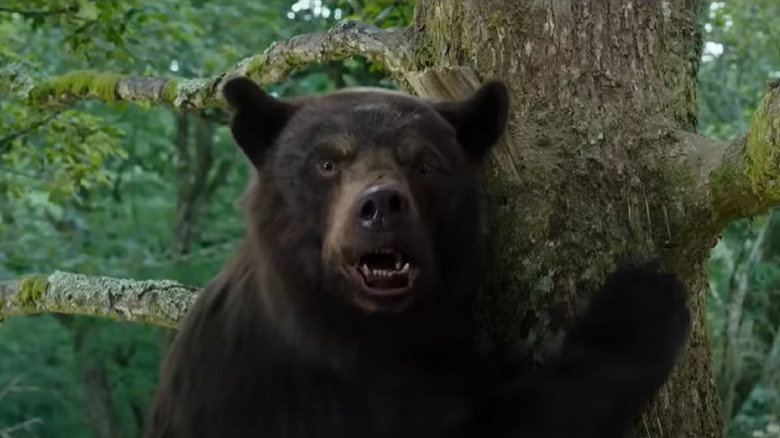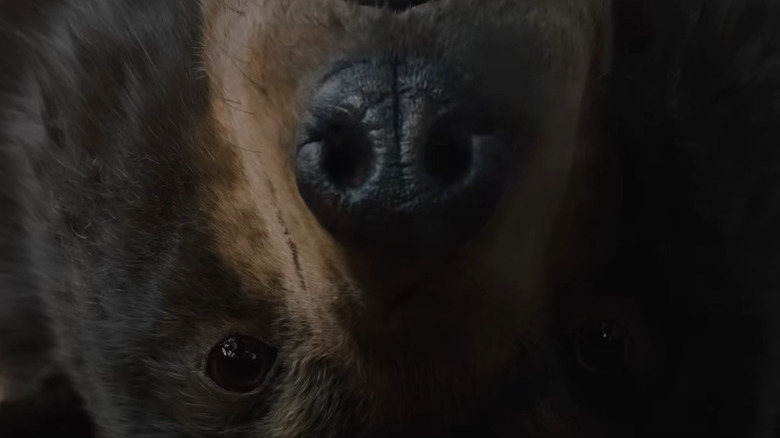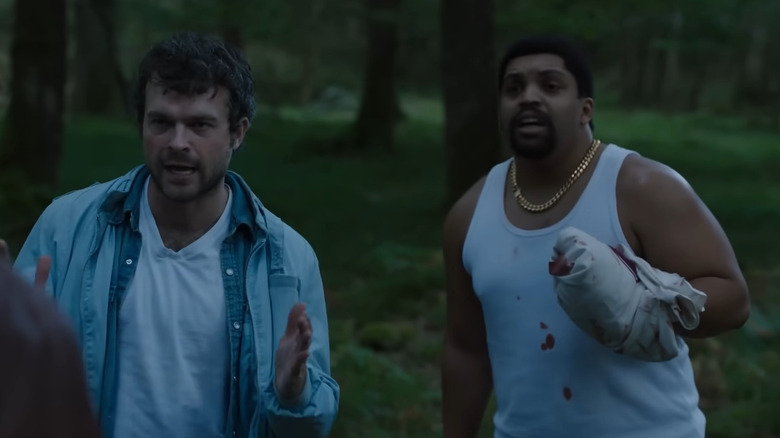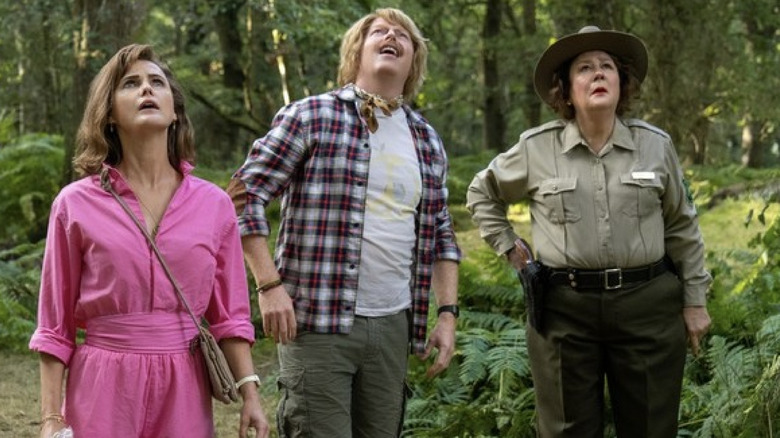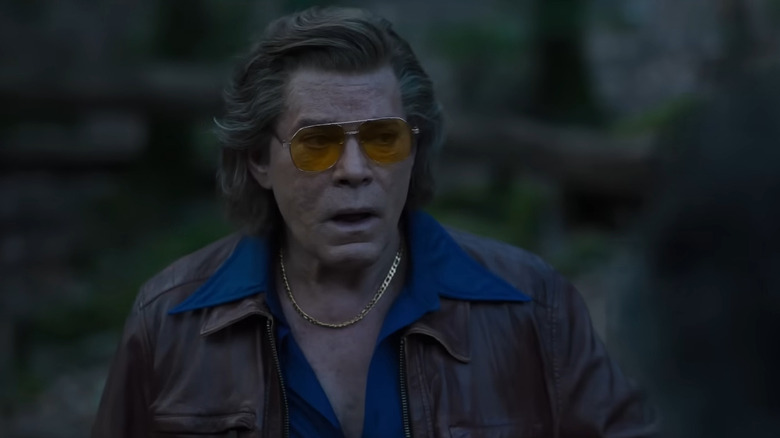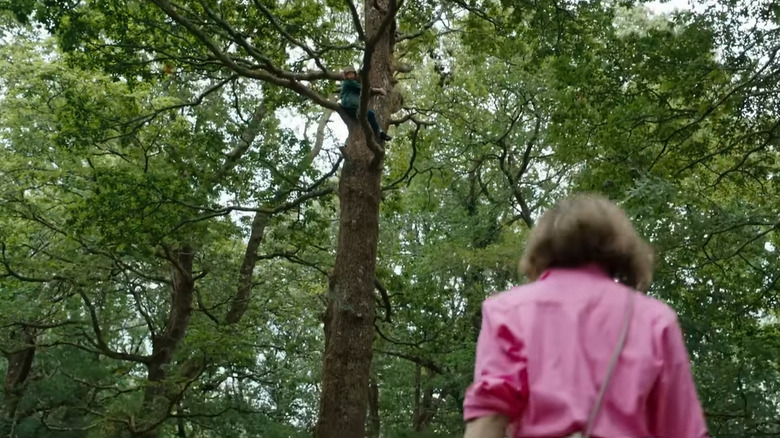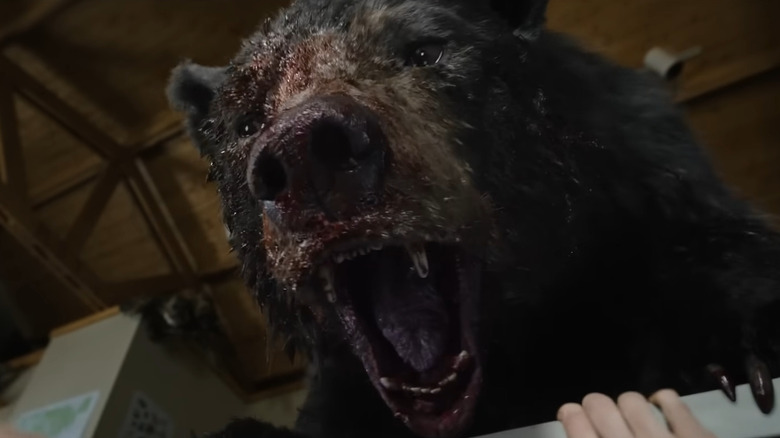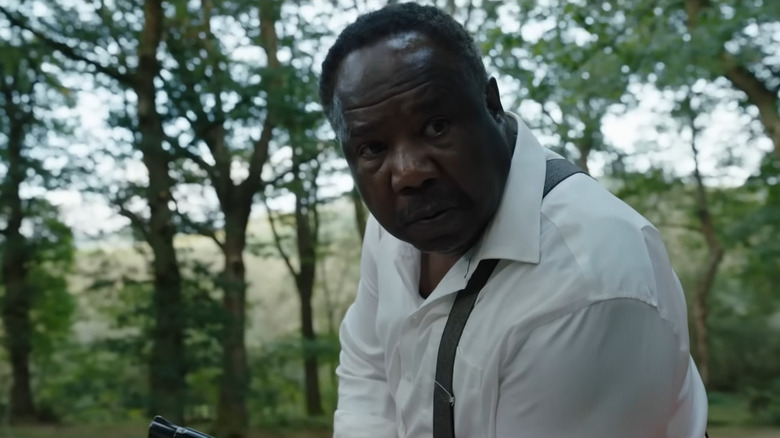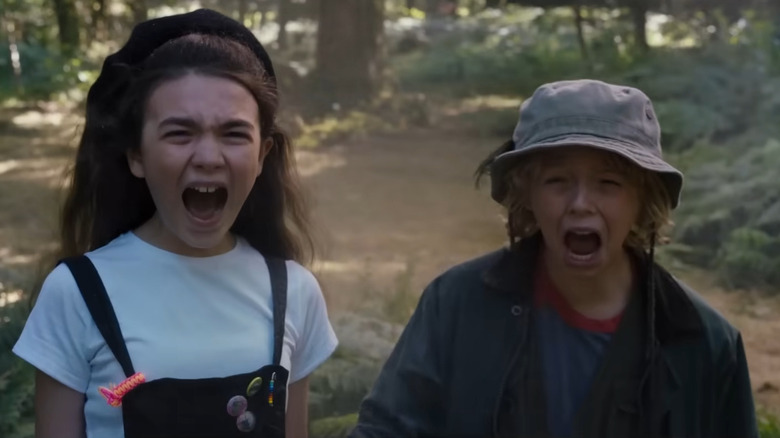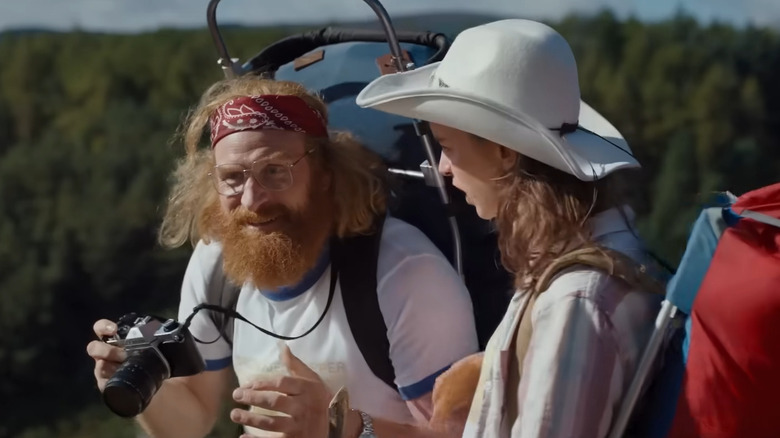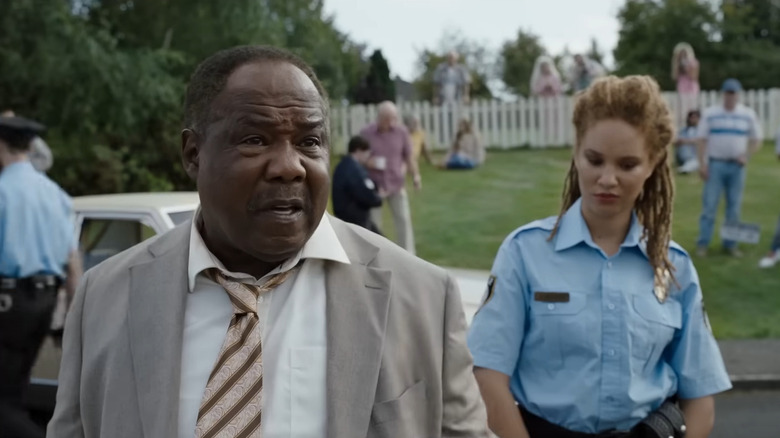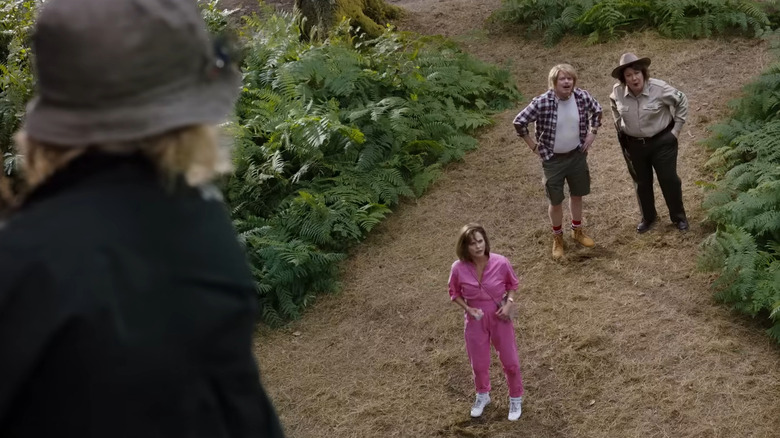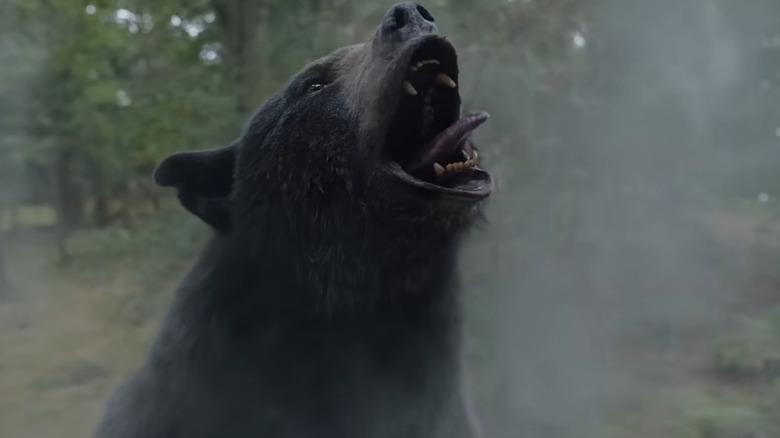The Ending Of Cocaine Bear Explained
To paraphrase the Grateful Dead: "Riding that train, high on Cocaine Bear." The new horror comedy from director Elizabeth Banks and screenwriter Jimmy Warden is indeed a wild ride, and not one that necessarily lends itself to deep-dive literary analysis ... or so you might think. Despite what comedian Scott Seiss — who plays one of the film's many hapless imperiled — would have you believe, there are layers upon layers to explore in the ending of "Cocaine Bear." (Okay, maybe not quite.)
At just over an hour and a half in length, "Cocaine Bear" eschews the lumbering runtimes that have plagued so many recent blockbusters and jumps straight into the action. A buffoon of a drug smuggler drops dead flying over Georgia's Chattahoochee National Forest, and his stash of snowdrops right along with him. A local American black bear ingests a heavy dose of the stuff and goes on a rampage through the woods, indiscriminately murdering small-time crooks, innocent hikers, and paramedics alike.
The protagonist in this one-bear "Jurassic Park" is a nurse and single mother Sari (Keri Russell), whose teenage daughter Dee Dee (Brooklynn Prince) runs away to the forest on the worst possible day. There's also put-upon detective Bob (Isaiah Whitlock Jr.), drug kingpin Syd (Ray Liotta), and his lackeys Daveed (O'Shea Jackson Jr.) and Eddie (Alden Ehrenreich), who is also his son. The film's climax sees all these characters and more assemble in the Cocaine Bear's shadowy lair, leading to a gruesome finale. Below, a (spoiler-heavy) breakdown.
Coked-up cubs
When Sari finally finds Dee Dee at the end of "Cocaine Bear," she's taking shelter in the bear's own cave. Presumably, the bear took her there, as it would be a highly questionable hiding place for her to choose on her own. Of course, the logistics of the whole things are kind of brushed over. It takes Sari and Henry (Christian Convery) all day to track Dee Dee down, so she must have gotten to the cave pretty fast after the initial attack. Then there are even more questions, like why the bear didn't eat her (she definitely would have had some cocaine scent on her). Best not to overthink it.
Anyway, Sari and Henry's arrival at the bear lair brings a not so shocking revelation: The bear itself, revealed earlier to be female, has two cubs. And yes, they also got into that nasty powder. According to Smithsonian Magazine, mother bears have been known to use humans as protection for their offspring, though not quite in a "kidnap you and take you to live in my cave" kind of way. But with her brain chemistry being effectively rewritten by the dope, maybe the Cocaine Bear was hoping for Dee Dee to act as a kind of guardian.
The common idea that mama bears often defend their cubs from humans aggressively is widely disputed, however. The Cocaine Bear doesn't seem to be protective as much as she is manic and hooked. Alas, these violent delights have violent ends, and the ending of "Cocaine Bear" is nothing if not Shakespearean.
Everyone has a limit
Before Sari can get Dee Dee and Henry out of the Cocaine Bear's cave, Syd and his crew show up. They find a good amount of dope stashed under the cubs' noses (no pun intended, though the bears themselves have clearly ingested a fair bit of it), but Syd isn't satisfied. He reminds Eddie of his earlier threat — that the cartel from which he gets his shipments will come for them both, and for Eddie's own son, if they don't reclaim the drugs. While this may be true (the film kind of abandons that thread), no one else in the gang seems gung-ho to continue the hunt.
Crooked Officer Reba (Ayoola Smart) decides she's had it with the whole ordeal and declares her intention to leave. When Syd pulls a gun on her, Daveed steps in the way. It's a pretty surprising move given how much Daveed has been willing to give up — his fingers, for instance — in pursuit of the cocaine. But even he, Syd's most loyal follower, seems to have hit his limit.
This is the kind of deeply human question that "Cocaine Bear" was clearly conceived to explore: What is the breaking point of someone who's dedicated themselves to a life of crime? When is enough enough? For Daveed, it comes in the middle of the bear cave — his literal darkest moment in the movie.
Mama Bear
The titular behemoth isn't the only mama to be reckoned with in "Cocaine Bear." Sari (Keri Russell) proves to be quite the force of nature herself when push comes to shove, willing to do anything to defend her own cubs. When Syd confronts her, Dee Dee, and Henry as they're escaping the cave, she shows no sign of fear. Even when he starts waving his gun around, it doesn't shake her. When she finesses that same gun into her own hands (through a truly befuddling chain of events), her unwavering bravery becomes even more apparent.
Wanting nothing more than to be rid of the cocaine, the bear, and the assembled gang of crooks for good, Sari takes her courage to a truly cinematic place. She channels literary and cinematic giants like Butch Cassidy, the Sundance Kid, and Sherlock Holmes, leaping off her perch with the kids in tow into the rushing water beneath the waterfall. Lo and behold, Mama Bear gets her cubs out safe.
Its a triumphant moment. There is no greater power, "Cocaine Bear" seems to say, than that of a mother fighting for her children. Sari demonstrates this by jumping Henry and Dee Dee to safety, and the idea is echoed moments later by the Cocaine Bear herself.
Drugs kill
In a way, "Cocaine Bear" acts as its own PSA in the style of the old anti-drug commercials montaged at its start. The lesson seems to be, don't become a cocaine kingpin, because if you do, a 400-pound black bear will rip out your entrails and feed them to her babies.
Clearly, Syd (Ray Liotta) didn't get that memo. When everyone else — including his own son — insist that their venture is foolhardy, Syd remains dedicated. Even without his gun, he refuses to abandon the cause, so Eddie and Daveed leave him. For a moment, it looks like the villain — who represents the evil machinations of the underworld at large — might win. But then a clumsily dropped package of coke wakens the KO'd mama bear, yielding perhaps the most gruesome death scene in a movie chock-full of them. Cocaine Bear tears open Syd's guts, and her cubs feast.
This scene is particularly wild given that "Cocaine Bear" was the last movie Liotta filmed before his death, but according to director Elizabeth Banks, he was a huge fan of his absurd role. "He came in for ADR eight days before he passed away, actually, and he loved it," Banks said at the film's premiere. "He was so happy. He was laughing. It was just delightful." Liotta's absurd turn as Syd is a memorable one, worthy of the late star's impressive body of work.
Happily ever after?
Though Syd gets brutally wrecked at the end of "Cocaine Bear" — the last in a long laundry list of kills — some of the core characters make it out alive. Sari gets both Dee Dee and Henry out safe and sound, and in one of the last shots of the movie, the three can be seen trekking out of the park.
From the zoomed-out perspective on the scene, viewers can still hear snippets of a wholesome conversation between mother and daughter. Dee Dee apologizes for running off and skipping school, and Sari tells her she's just glad she's safe. Sari apologizes for pushing her new boyfriend on Dee Dee too soon, but her daughter tells her she's glad he makes her happy. Dee Dee then says that she's decided to join him and her mom on their upcoming trip to Nashville to see his band play. After everything the two have been through, they're certainly deserving of a little vacation.
Cocaine Bear rides again
The original true story that inspired "Cocaine Bear" didn't exactly have a happy ending for the bear, though it was certainly preferable for the humans involved. The story only emerged after the bear's dead body was discovered in the woods next to a good portion of the discarded dope. There was no rampage; no cinematic bloodbath. Just a poor, innocent animal whose body gave out after ingesting an ungodly amount of the stuff.
"Cocaine Bear" gives its titular character a more optimistic ending. Despite absorbing a similarly massive quantity of Columbian white, the mama bear and her cubs all seem fine at the end of the movie. A last-second shot even reveals a new group of hikers moronically trying to take pictures of the bear fam. It can only be assumed that they meet the same grisly (grizzly?) end.
Given the sad story of the actual Cocaine Bear — dubbed "Pablo Escobear" after its death — it's nice to see the movie version go out on a happier note. In an interview with Entertainment Weekly prior to the release of the film, Elizabeth Banks said she saw her version as "a revenge story for the bear." As such, it's only fitting that she lives to tell the tale.
What happens to the rest of the cocaine?
Onscreen text at the end of "Cocaine Bear" says a good portion of the dumped drugs wind up unaccounted for. It's difficult to pinpoint how accurate that is to the true story, but in the movie, viewers see at least one full duffel bag escape in the hands of Stache (Aaron Holliday).
One third of the misguided knife gang known as the Duchamps, Stache is the only one to survive the film. His two best friends, who made a living holding up tourists in the park with him before being taken down by Daveed, are ripped to pieces by the Cocaine Bear about halfway through. Surely, Stache will carry those traumatic losses with him, as he seems to be the sensitive sort. He's also the sort to cut all ties and hit the road hitchhiking with enough cocaine to make him a rich man.
What becomes of Stache is difficult to say, but that's part of the grand, Kubrickian labyrinth that makes "Cocaine Bear" so complex. Regardless, it's a good thing he keeps the powder out of the mouths of the sheep in the truck he catches a ride in. "Cocaine Sheep" just doesn't have the same ring to it.
Parental advisories
What is "Cocaine Bear" really about? Like the epic poetry that is the "Fast and Furious" franchise, it's a story about family, but specifically the relationships between parents and their children. Nearly every core character has some kind of parent/child relationship that ties them to this central theme. There's obviously the bear herself, who fights to protect her cubs, and Sari, who ventures into danger to ensure her daughter's safety. When Syd demands to know who Sari is during the climax, she responds simply, "a mom." In the moment, it's all that matters.
This sentiment is echoed moments later, when Dee Dee thanks her mother for risking life and limb to find her. "Thanks for coming to get me," she says. "I'm your mom" is the only reply that's needed.
Henry's own home life sounds a bit more complicated. Dee Dee's references to his father "definitely" doing cocaine and his own admittance that his dad didn't have time to pack him a lunch paint a less than perfect picture, but the film doesn't zoom in close enough to really reveal what's going on there. Fortunately, Sari treats Henry like an adopted son, and the kid clearly has a good head on his shoulders.
Family is what matters most
In the same scene where Syd confronts Sari, Henry gives the criminal a piece of his own mind. "You're a piece of crap person," he shouts at the drug lord, "and a bad dad." In the latticed thematic framework of the film, the second indictment is even more cutting than the first. Syd is a bad dad. Rather than console Eddie after the loss of his love, Joan, he prods and tricks him into rejoining the crooked family business — one that Eddie now despises. Syd follows Daveed and Eddie before he even knows there'll be trouble. He doesn't trust his son, and he hardly seems to love him, though he claims everything he's doing is meant to protect his family.
To be fair, Eddie has been lacking in the parental department, but he steps back into his duties as a father with a puppy in tow (and possibly on coke) at the end of the story. With Daveed by his side and a near-death experience behind him, it seems like he's on the right path. It's also nice to see a happy ending for Rosette the dog, who functionally serves as a child figure for Detective Bob. The veteran cop may die unceremoniously atop a gazebo, but his last thoughts are of Rosette. This sweet moment connects Bob to the greater thematic tapestry of "Cocaine Bear," reaffirming the film's literary merit.
Failed institutions
Another major theme running through the bloodstream of "Cocaine Bear" is the utter incompetence of American institutions. Elizabeth Banks has spoken about "Cocaine Bear" being about America's failed war on drugs, and there's clear satire in the film's take on both law enforcement and the narcotics trade. Early on, when Sari joins up with park ranger Liz (Margo Martindale), she seems surprised that the other woman has a gun. "Park rangers are peace officers," Liz responds. "That means we can shoot people."
The paradox of her reply is just one of the film's jabs at the law enforcement establishment, portrayed throughout as bumbling and ineffectual. Later on, while trying to kill the bear, Liz shoots one of the Duchamps in the back of the head. When Bob discovers that Reba is actually working for Syd, he's aghast. "I trusted you," he cries. "The United States of America trusted you!" Reba, for her part, seems unenthused with the whole situation. Clearly, she's not a believer in the cause.
This takedown of institutions extends to the drug business itself. The fact that Andrew Thornton — who was a narcotics officer for the government before jumping the fence and becoming a smuggler, by the way — dies jumping out of his own airplane is just ridiculous. But then, that's one of the parts of the movie that's completely true to fact. Syd ends up getting eaten under a waterfall in the middle of nowhere, all because the people he works with are rotten at their jobs.
Nature always wins
If there's a final, resounding message that "Cocaine Bear" seems to endorse, it's that no matter how much humans subdue and bend nature, it will never be fully conquered. "As a reminder, nature always wins," Elizabeth Banks said while discussing the film with Esquire. At the end of the movie, that's certainly true.
Supposed wildlife expert and animal rights activist Peter (Jesse Tyler Ferguson) acts as a kind of incompetent wall against which the film spatters the brute force of nature. He calls animals "friends" because he doesn't like to call them animals, and he's incensed when he learns that someone must have set the bear off somehow. Peter clearly has good intentions, but his view of the natural world as a child that must be protected (the parental theme again) is ill-equipped to deal with reality.
Humans do ravage the natural environment daily; it's equally true that nature bites back — be it with bears, diseases, or natural disasters.
Will there be a Cocaine Bear 2?
"Cocaine Bear" is the rare exception in today's blockbuster landscape — an exciting, unique film based on no preexisting IP and with no apparent intention of spawning sequels. But this is 2023, and a movie is only as valuable as a studio's ability to turn it into a franchise.
While the bear herself is alive and well at the end of the movie, a sequel hardly seems like it would have much story to stand on. No sequel plans have been announced. Then again, before the film was even released in theaters, soon-to-be viewers took to the internet to discuss the discovery of a so-called "Cocaine Shark" off the coast of New Zealand. Somewhere, somebody is undoubtedly optioning the rights.
Branching out into the rest of the animal kingdom for more movies like "Cocaine Bear" sounds like the smarter move, should Universal decide to go that route. However, the film would likely be remembered best for what it is right now: a one-off goof spoof of a wild true story about the war on drugs, parenthood, and a massive bear on cocaine.
If you or anyone you know needs help with addiction issues, help is available. Visit the Substance Abuse and Mental Health Services Administration website or contact SAMHSA's National Helpline at 1-800-662-HELP (4357).
